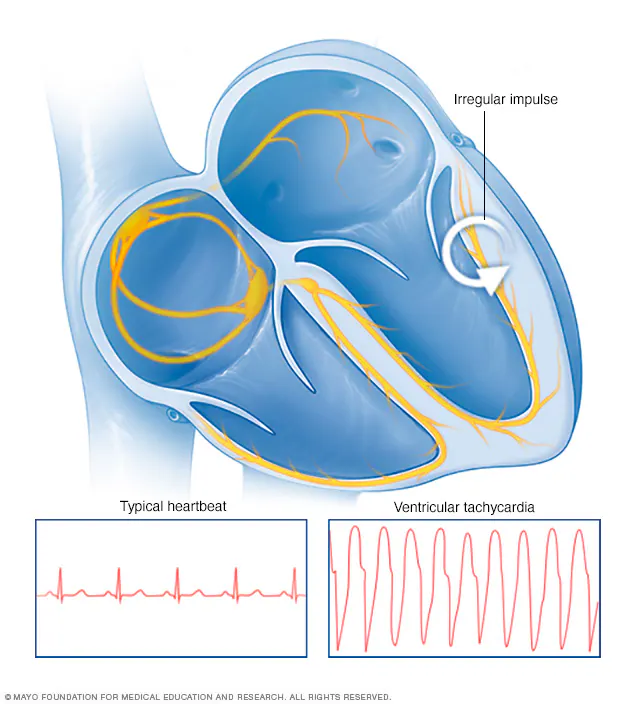Overview Of Ventricular tachycardia
Ventricular tachycardia (VT) is a potentially life-threatening arrhythmia characterized by a rapid heart rate originating from the ventricles, the lower chambers of the heart. It is defined by three or more consecutive ventricular beats at a rate greater than 100 beats per minute. VT can be sustained (lasting more than 30 seconds) or non-sustained (lasting less than 30 seconds). It can disrupt the heart’s ability to pump blood effectively, leading to symptoms such as dizziness, palpitations, or syncope. In severe cases, VT can degenerate into ventricular fibrillation (VF), a fatal arrhythmia. VT is often associated with underlying heart disease, such as myocardial infarction or cardiomyopathy. ---
Symptoms of Ventricular tachycardia
- The symptoms of ventricular tachycardia (VT) vary depending on the heart rate, duration, and presence of underlying heart disease. Common symptoms include palpitations, chest pain, shortness of breath, dizziness, or syncope (fainting). In some cases, VT may be asymptomatic and detected incidentally on an electrocardiogram (ECG). Sustained VT can lead to hemodynamic instability, causing hypotension, shock, or cardiac arrest. Early recognition of symptoms is crucial for prompt diagnosis and treatment. ---
Causes of Ventricular tachycardia
- Ventricular tachycardia (VT) is caused by abnormal electrical activity in the ventricles, often due to structural heart disease. The most common cause is ischemic heart disease, particularly after a myocardial infarction, which creates scar tissue that disrupts the heart’s electrical pathways. Other causes include cardiomyopathy, heart failure, electrolyte imbalances (e.g., hypokalemia or hypomagnesemia), drug toxicity (e.g., from antiarrhythmics or stimulants), and genetic conditions like long QT syndrome or Brugada syndrome. Trauma, electric shock, or severe hypoxia can also precipitate VT. Understanding the underlying cause is essential for effective treatment and prevention. ---
Risk Factors of Ventricular tachycardia
- Several factors increase the risk of ventricular tachycardia (VT). The most significant risk factor is structural heart disease, particularly coronary artery disease and prior myocardial infarction. Other risk factors include cardiomyopathy, heart failure, electrolyte imbalances, and genetic arrhythmia syndromes like long QT syndrome or Brugada syndrome. Lifestyle factors, such as smoking, excessive alcohol use, or stimulant abuse, also elevate the risk. Preventive measures, such as managing heart disease and avoiding triggers, reduce the likelihood of VT. ---
Prevention of Ventricular tachycardia
- Preventing ventricular tachycardia (VT) involves managing underlying risk factors and adopting heart-healthy lifestyles. Controlling conditions like coronary artery disease, hypertension, and diabetes reduces the risk. Avoiding excessive alcohol or stimulant use and maintaining electrolyte balance are important. For high-risk patients, implantable cardioverter-defibrillators (ICDs) provide protection against life-threatening arrhythmias. Regular follow-up with healthcare providers ensures early detection and management of risk factors. ---
Prognosis of Ventricular tachycardia
- The prognosis for ventricular tachycardia (VT) varies depending on the underlying cause and the presence of structural heart disease. Patients with VT and normal heart structure generally have a good prognosis with appropriate treatment. However, VT in the setting of significant heart disease, such as prior myocardial infarction or cardiomyopathy, carries a higher risk of sudden cardiac death. Early diagnosis, adherence to treatment plans, and lifestyle modifications improve outcomes. Public health measures, such as promoting heart-healthy lifestyles and screening for genetic conditions, further enhance prognosis. ---
Complications of Ventricular tachycardia
- Ventricular tachycardia (VT) can lead to severe complications if untreated. Hemodynamically unstable VT can cause hypotension, shock, or cardiac arrest. Prolonged VT may lead to heart failure due to reduced cardiac output. In some cases, VT can degenerate into ventricular fibrillation (VF), a fatal arrhythmia. Early intervention and proper management are essential to prevent complications and ensure patient safety. ---
Related Diseases of Ventricular tachycardia
- Ventricular tachycardia (VT) is closely related to other cardiac arrhythmias, such as ventricular fibrillation (VF) or atrial fibrillation (AF). It shares similarities with conditions like myocardial infarction, cardiomyopathy, and heart failure, which are common underlying causes of VT. Genetic arrhythmia syndromes, such as long QT syndrome or Brugada syndrome, are also associated with VT. Understanding these related diseases is important for comprehensive diagnosis and management. Preventive measures for VT also reduce the risk of other cardiovascular conditions. ---
Treatment of Ventricular tachycardia
The treatment of ventricular tachycardia (VT) depends on the severity of symptoms and the presence of underlying heart disease. Acute management of hemodynamically unstable VT involves immediate cardioversion or defibrillation. Stable VT may be treated with antiarrhythmic medications, such as amiodarone or lidocaine. Long-term management includes implantable cardioverter-defibrillators (ICDs) to prevent sudden cardiac death and catheter ablation to eliminate the source of the arrhythmia. Managing underlying conditions, such as heart failure or electrolyte imbalances, is also essential. Early and targeted treatment improves outcomes. ---
Generics For Ventricular tachycardia
Our administration and support staff all have exceptional people skills and trained to assist you with all medical enquiries.


